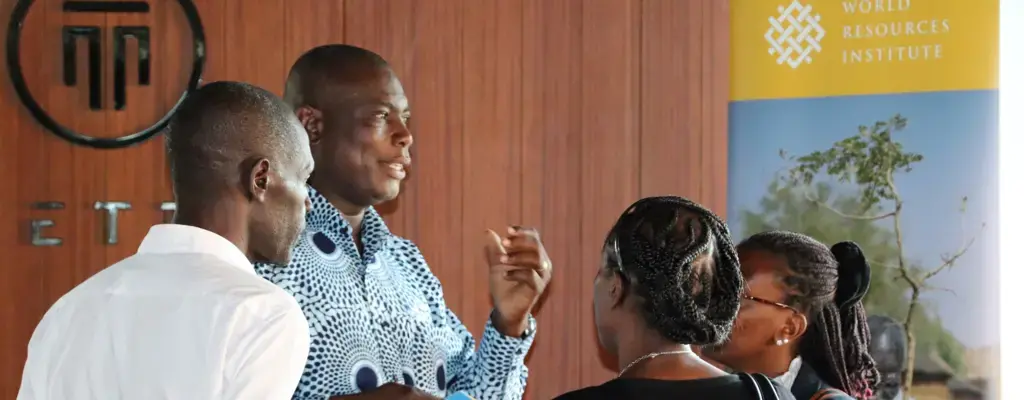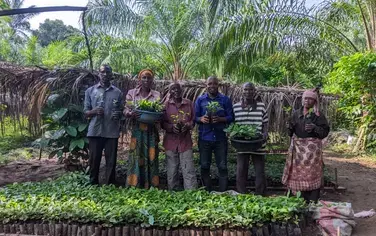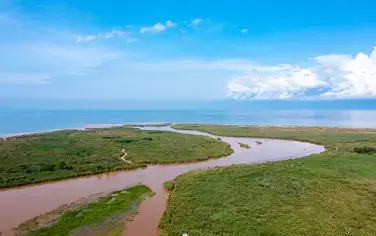Twelve energized entrepreneurs from seven African countries – leaders within their own communities – met over four days to grow their companies and create thousands of jobs in rural Africa. What united them? They are all in the business of restoring degraded land across the continent and deeply committed to a greener world. This was the world’s first start-up accelerator dedicated to empowering land restoration entrepreneurs and an important step to directing much-needed finance to rural economies.
During the Land Accelerator, organized by the World Resources Institute (WRI) in December in Nairobi, the entrepreneurs received business and investment training by Fledge, a network of conscious company accelerators that has made over 30 investments in Africa. They also worked with technical experts and mentors to help accelerate their businesses to the next level. On the final day, after working round-the-clock to practice their pitches, the Accelerator graduates had the opportunity to present their businesses to a packed room of investors and members of the Nairobi business community. Kuki Njeru of Green Pot Enterprises, a vertically-integrated Kenyan bamboo company, was one of the entrepreneurs who participated. She said, “I have gotten so many people talking to me, and many investors have spoken to me this afternoon.”
Addisu Hailu, one of the participants, said “It was a big, mind-changing time that we had.” He set up SA Bamboo Works in Ethiopia after finishing his thesis on the economic use of bamboo and spotted an opportunity in the country that produces 65 percent of African-grown bamboo. The company is now a leading bamboo manufacturer, employing 300 workers across three factories, and counts IKEA among its customers. Adissu shared some of his company’s products with the audience at the Accelerator, including floor boards, furniture and incense sticks for local and export markets.
Meanwhile, in Rwanda, another success story is emerging. Norelga Macadamia is a roasted macadamia nut production company and Rwanda’s first industrial macadamia processor. Led by Norce Elysee Gatarayiha, the company is both helping to fight malnutrition and restore degraded land. Norce began with savings of $10,000 and 12,000 macadamia trees. He now works with 750 farmers, supplying to the local and export markets, including to RwandAir. To take his business to the next stage, he is seeking an investment of $500,000 to plant one million trees, as well as a new production facility and factory for processing.
These companies are making restoration profitable, but the bottom line is only the beginning of the story. By restoring land (often by planting trees), these entrepreneurs not only create local jobs, but they also contribute to food production and water security. And by sequestering carbon into plants and soil, these companies make an important dent in the fight against climate change.
The Accelerator’s custom-designed program included topics like climate resilience and nursery management to help these entrepreneurs expand their business and scale up their restoration efforts. Scaling up is important because these 12 companies play a prominent role in a much larger regional and international movement. African countries have committed to bring 100 million hectares of degraded land into restoration by 2030 as part of the country-led African Forest Landscape Restoration Initiative (AFR100), contributing to the global Bonn Challenge goal of 350 million hectares of land restored worldwide. Twenty-eight African countries have so far pledged to restore 113 million hectares of degraded land, but government action won’t be enough. To meet these ambitious goals, mobilizing the private sector is essential.
Participants in Nairobi reported immediate benefits from the Accelerator, including learning how to build a financial model and public speaking and story-telling. “It was an eye-opening program for us,” said Samuel Rigu of Safi Organics. “Now we are much better, and we can tell our story better.” But the learning went deeper than slides and lectures: Theodore Ocansey of Kete-Krachi Farms said, “I learned a lot about myself as an entrepreneur.”
These passionate entrepreneurs can now put their newfound knowledge into action, with the potential to grow faster, attract capital and improve their land management practices. “I kept on absorbing like a sponge,” Kuki Njeru from Green Pot Enterprises said. “Now I know where I used to go wrong… It’s a great boost not just for your business, but for you as a person.” WRI and Fledge will continue to work with the businesses to connect them to investors and mentors. Their story has only just begun.
To learn more about the entrepreneurs who successfully completed the Land Accelerator, you can watch all all 12 pitches from the Demo Day here.




